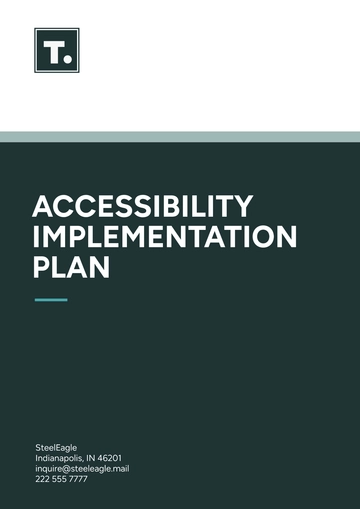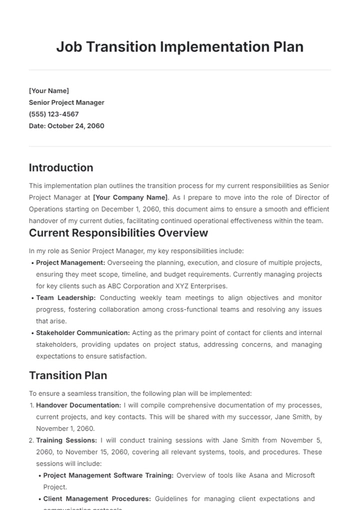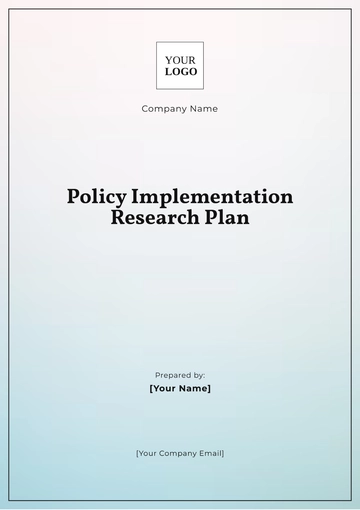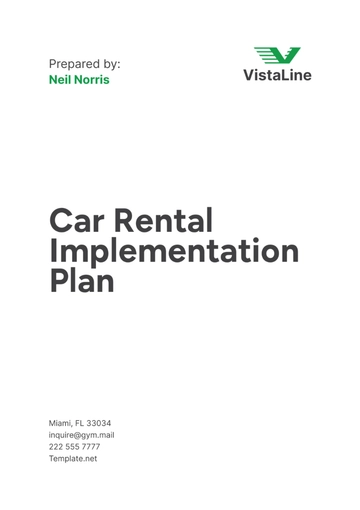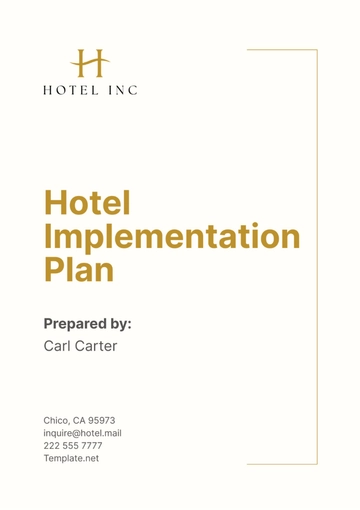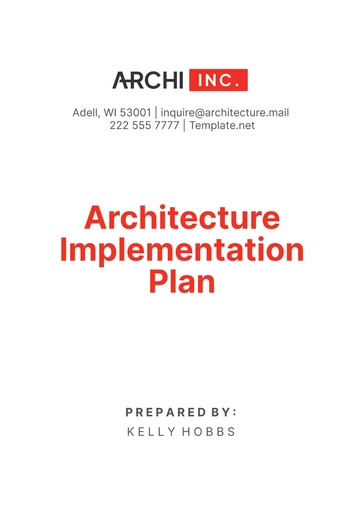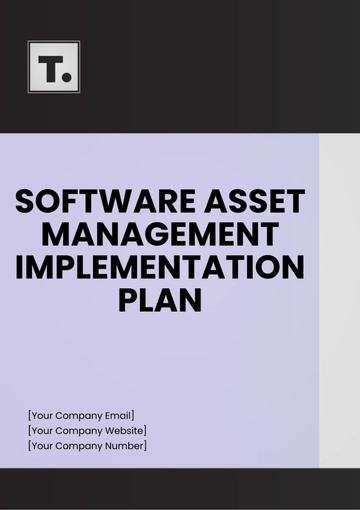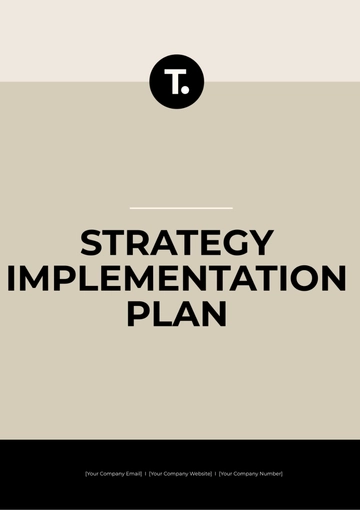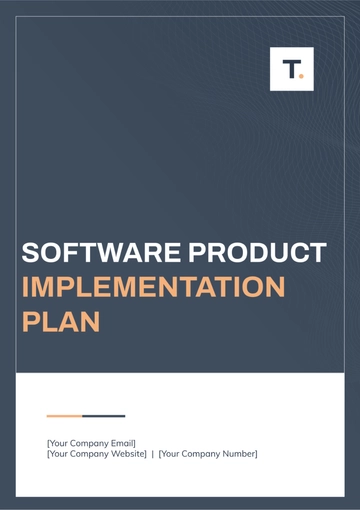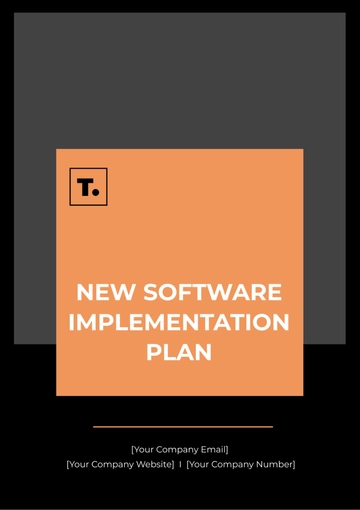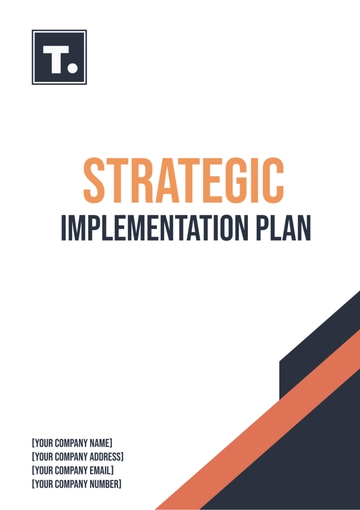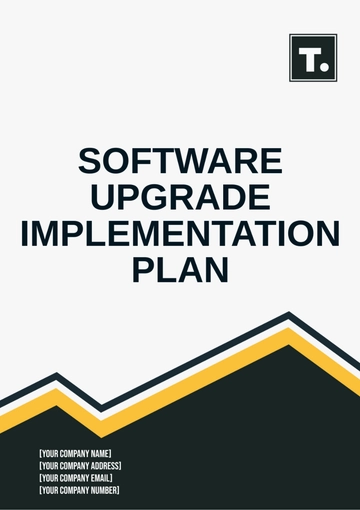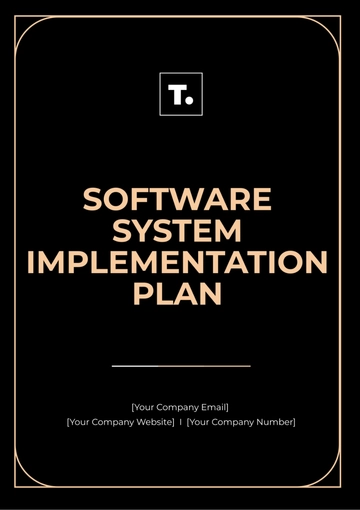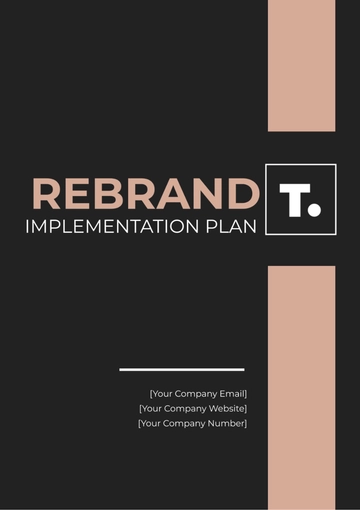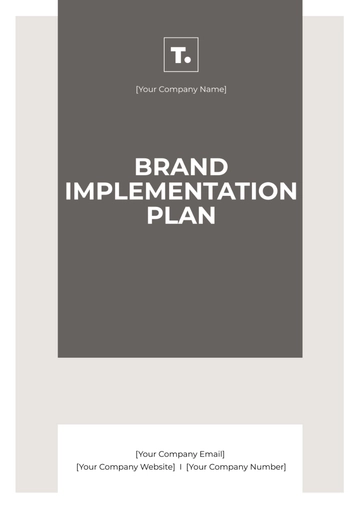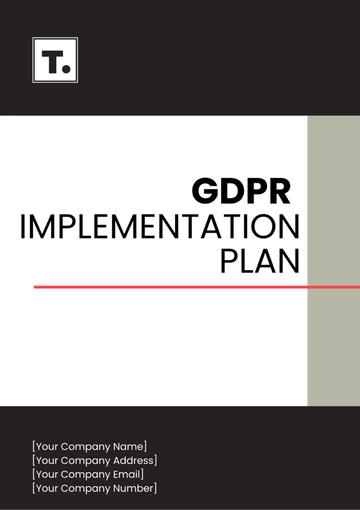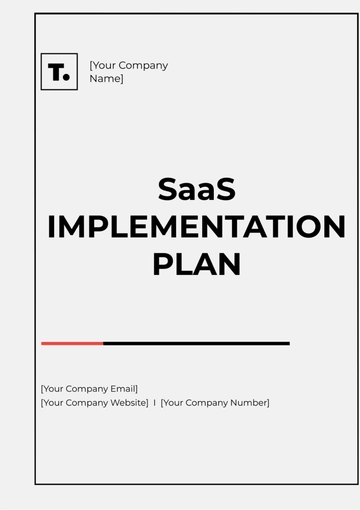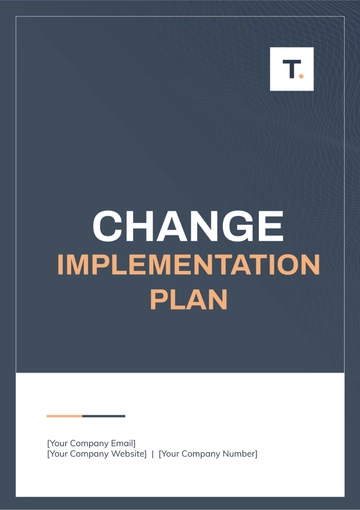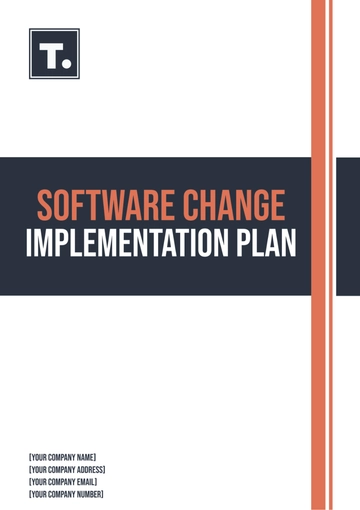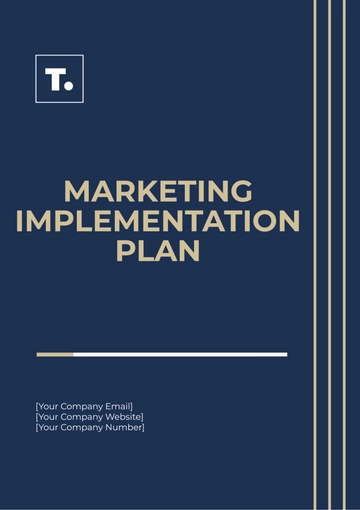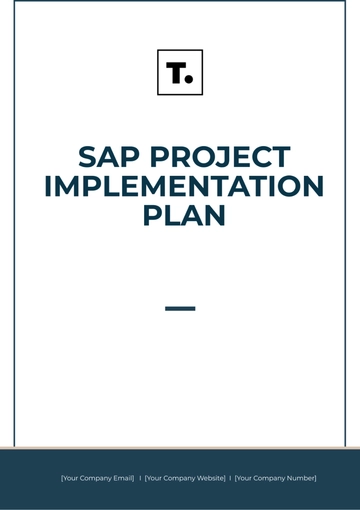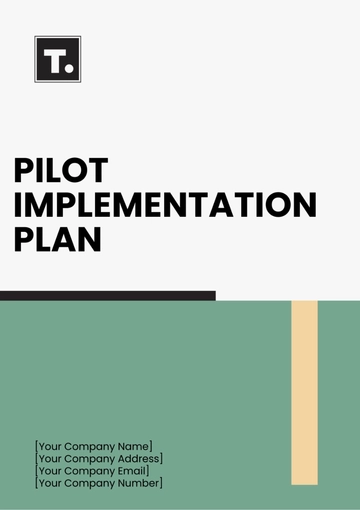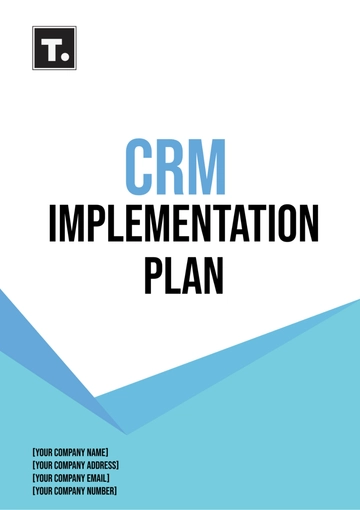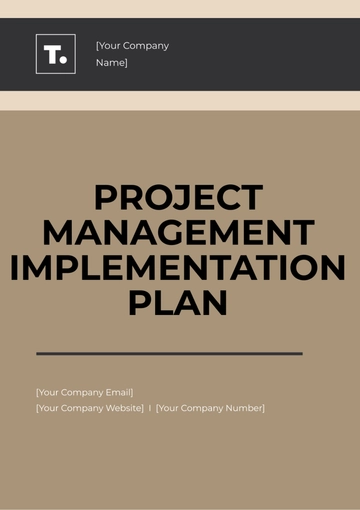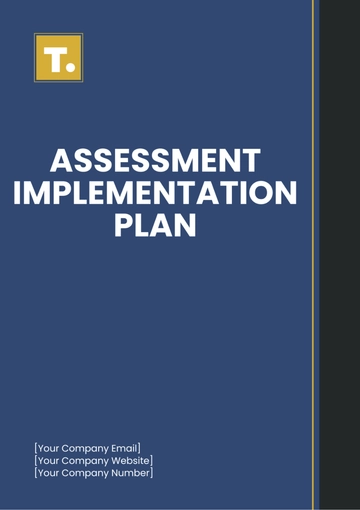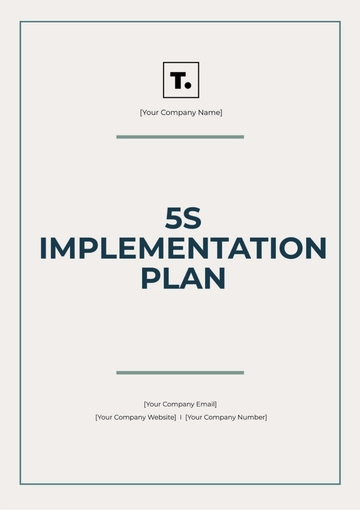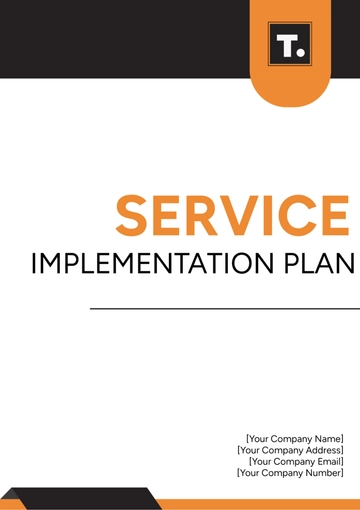Free Hotel Implementation Plan
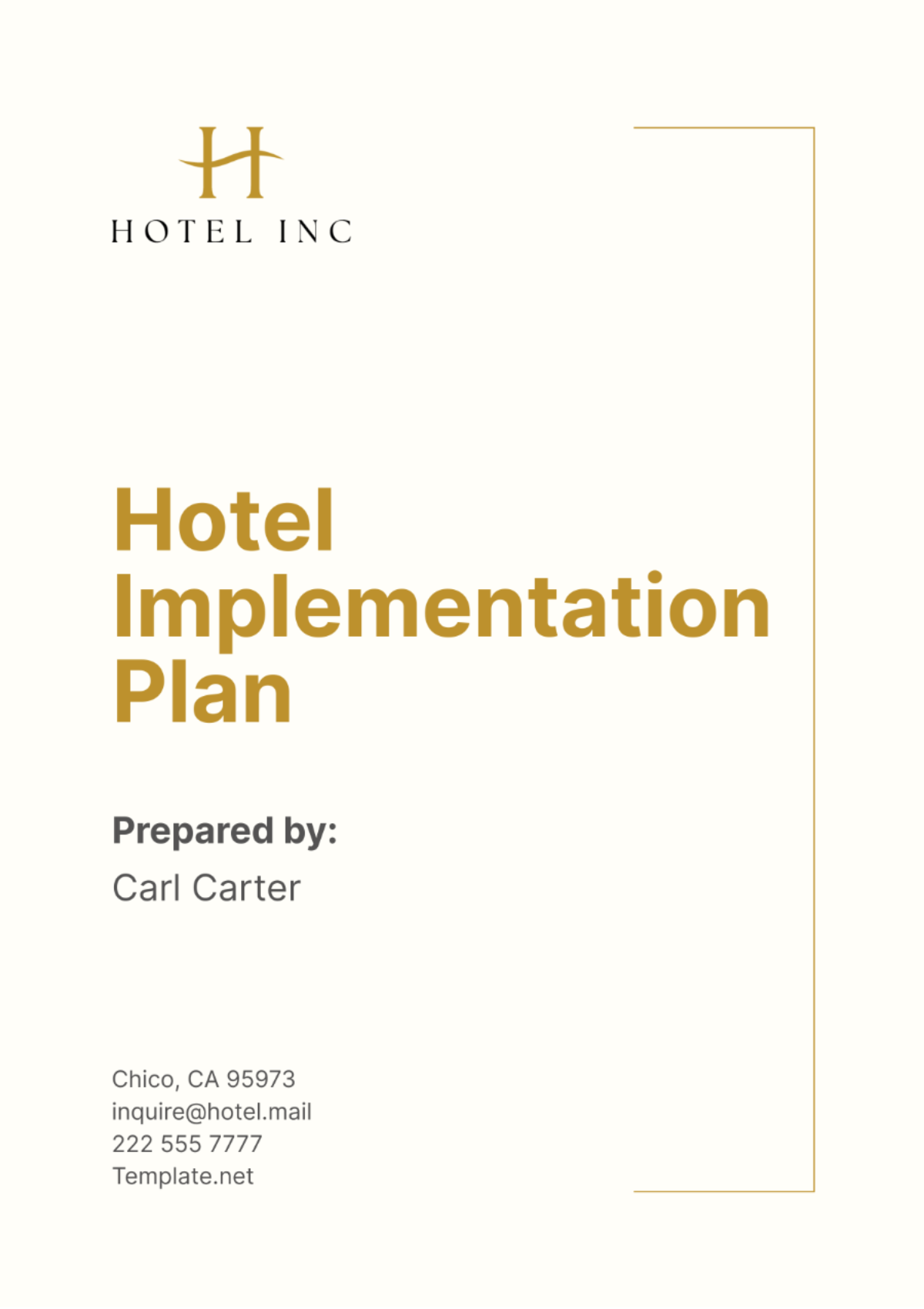
I. Introduction
A. Purpose of the Hotel Implementation Plan
The purpose of this Hotel Implementation Plan is to provide a structured framework and roadmap for hoteliers looking to onboard [Your Company Name]'s advanced hotel management software solution. This plan serves as a blueprint for orchestrating a smooth transition from existing systems to our state-of-the-art platform.
By delineating clear objectives, delineating roles and responsibilities, and establishing timelines, this plan aims to streamline the implementation process, mitigate risks, and ensure successful adoption of the software across all levels of the hotel's operation.
B. Scope
This implementation plan encompasses a comprehensive range of activities, including assessment, planning, deployment, training, and ongoing support, to ensure a holistic approach to software implementation.
It encompasses all aspects of hotel operations, from front desk management and guest services to housekeeping, maintenance, and financial reporting, ensuring that every department is seamlessly integrated into the new software ecosystem.
C. Audience
The primary audience for this plan includes hotel owners, general managers, department heads, and frontline staff who will play pivotal roles in the implementation process. It is essential for these stakeholders to understand their roles, responsibilities, and the overall roadmap outlined in this plan.
Additionally, IT personnel responsible for infrastructure management, data security, and software integration will find this plan invaluable in ensuring technical alignment and compatibility with existing systems.
II. Pre-Implementation Phase
A. Assessment and Planning
Conducting a thorough assessment of the hotel's current operational landscape is the cornerstone of the pre-implementation phase. This entails conducting interviews, surveys, and on-site observations to gain insights into existing workflows, pain points, and areas for improvement.
Collaborate closely with hotel stakeholders, including owners, managers, department heads, and frontline staff, to gather diverse perspectives and align objectives. This collaborative approach fosters a sense of ownership and ensures that the implementation plan reflects the unique needs and priorities of the hotel.
B. System Requirements
Determining the system requirements involves a meticulous examination of both hardware and software prerequisites necessary to support [Your Company Name]'s hotel management software. This includes assessing server specifications, workstation capabilities, network infrastructure, and software dependencies.
Conduct a thorough audit of existing hardware and software assets to identify potential gaps or areas requiring upgrades. This proactive approach helps preempt compatibility issues and ensures a seamless integration process without disruptions to daily operations.
C. Data Migration
Data migration is a critical component of the pre-implementation phase, involving the seamless transfer of essential information from legacy systems to the new software platform. This includes guest profiles, reservation records, billing history, and other operational data.
Develop a robust data migration strategy that encompasses data extraction, transformation, and loading processes. Prioritize data integrity and accuracy throughout the migration process, employing validation checks and reconciliation mechanisms to identify and rectify any discrepancies.
III. Implementation Phase
A. Installation
The installation phase involves setting up the necessary hardware components and deploying [Your Company Name]'s hotel management software on designated servers and workstations. This process begins with unpacking and assembling hardware components, including servers, workstations, networking equipment, and peripheral devices.
Once the hardware is in place, install the operating system and any prerequisite software required to support the hotel management software. Follow the installation instructions provided by [Your Company Name], ensuring compliance with recommended configurations and best practices.
B. Configuration
Configuration entails customizing the software settings and parameters to align with the specific requirements and preferences of the hotel. This includes defining room types, rates, taxes, amenities, and other property-specific details.
Collaborate closely with hotel management and department heads to configure user access permissions, roles, and privileges based on organizational hierarchy and job responsibilities. Implement robust security measures to safeguard sensitive data and ensure compliance with industry regulations.
C. Training
Training is a crucial component of the implementation phase, empowering hotel staff with the knowledge and skills required to leverage the full capabilities of the new software. Develop a comprehensive training program tailored to different user roles and departments, covering core modules such as reservations, check-in/check-out, housekeeping, and reporting.
Conduct hands-on training sessions supplemented with interactive demonstrations, user manuals, and training materials to accommodate diverse learning styles and preferences. Encourage active participation and feedback from trainees to foster a culture of continuous learning and improvement.
D. Testing
The testing phase involves rigorously evaluating the functionality, performance, and usability of the hotel management software to identify and address any bugs, errors, or inconsistencies. Develop test cases and scenarios that encompass common use cases and edge conditions across various modules and functionalities.
Engage key stakeholders, including hotel staff and management, in user acceptance testing (UAT) to validate system behavior and ensure alignment with business requirements. Document and prioritize identified issues and defects, collaborating with the software vendor to implement timely resolutions and updates.
IV. Post-Implementation Phase
A. Go-Live Preparation
As the implementation phase nears completion, finalize any remaining setup tasks and configurations to prepare for the official launch of the new system. This includes conducting final data validation checks, user access provisioning, and system performance tuning.
Communicate the go-live date and logistics to all hotel staff members, providing clear instructions and support resources to facilitate a smooth transition. Establish contingency plans and escalation procedures to address any unforeseen issues or challenges that may arise during the go-live process.
B. Go-Live Support
Provide on-site support and assistance during the initial days following the system's implementation to address any issues, questions, or concerns raised by hotel staff. Deploy a dedicated support team equipped with troubleshooting tools and resources to provide timely resolutions and minimize disruptions.
Establish a centralized helpdesk or support hotline accessible to all users, offering round-the-clock assistance and guidance for navigating the new software environment. Encourage open communication and feedback channels to solicit user input and improve support services based on evolving needs and requirements.
C. Monitoring and Optimization
Monitor system performance and user feedback closely during the post-implementation phase to identify areas for optimization and improvement. Implement monitoring tools and analytics dashboards to track key performance indicators (KPIs), system usage patterns, and user satisfaction metrics.
Proactively address any performance bottlenecks, usability issues, or functionality gaps through regular software updates, patches, and optimizations. Collaborate with [Your Company Name]'s support team and product development specialists to prioritize enhancement requests and feature enhancements based on user feedback and industry trends.
D. Ongoing Training and Support
Offer ongoing training opportunities and resources to hotel staff to reinforce their proficiency with the software and promote continuous skill development. This may include refresher courses, advanced training modules, and access to online knowledge bases and self-paced learning materials.
Provide continuous technical support and troubleshooting assistance to address any questions, challenges, or enhancement requests raised by hotel staff. Foster a culture of collaboration and partnership, positioning [Your Company Name] as a trusted advisor and strategic partner in driving operational excellence and guest satisfaction.
V. Risk Management
A. Identification of Risks
Conduct a thorough risk assessment to identify potential risks and challenges that may arise during the implementation process. This includes technical risks related to software compatibility, hardware failures, and data migration issues, as well as organizational risks such as resistance to change, insufficient training, and resource constraints.
Engage key stakeholders, including hotel management, department heads, and IT personnel, in risk identification workshops and brainstorming sessions to gather diverse perspectives and insights.
B. Risk Mitigation Strategies
Develop proactive risk mitigation strategies to address identified risks and minimize their impact on the implementation timeline and outcomes. This may involve implementing redundant systems, conducting thorough testing and validation procedures, and allocating additional resources to critical tasks.
Establish contingency plans and escalation procedures to address unforeseen risks and emergencies, ensuring that the implementation team is prepared to respond swiftly and effectively to mitigate potential disruptions.
C. Monitoring and Reporting
Implement robust monitoring mechanisms to track the progress of risk mitigation activities and identify any emerging risks or issues in real-time. This may include regular status updates, progress reports, and risk registers maintained by the implementation team.
Establish clear communication channels and reporting protocols to ensure that relevant stakeholders are kept informed of risk mitigation efforts and outcomes. Regularly review and reassess risks throughout the implementation process to adapt strategies and responses as needed.
VI. Quality Assurance
A. Quality Standards and Metrics
Define quality standards and metrics to measure the effectiveness and success of the implementation process. This may include criteria such as system reliability, performance efficiency, user satisfaction, and adherence to project timelines and budget.
Establish key performance indicators (KPIs) and benchmarks to track progress against predefined quality objectives and targets, providing a quantitative basis for evaluating the overall success of the implementation.
B. Quality Assurance Processes
Implement rigorous quality assurance processes and procedures to ensure that [Your Company Name]'s hotel management software meets or exceeds the established quality standards. This includes conducting thorough testing and validation activities at each stage of the implementation lifecycle.
Utilize industry best practices and quality assurance frameworks, such as ISO 9001 or CMMI, to guide quality assurance activities and ensure consistency, repeatability, and traceability in all aspects of the implementation process.
C. Continuous Improvement
Foster a culture of continuous improvement by soliciting feedback from stakeholders, monitoring performance metrics, and conducting post-implementation reviews and lessons learned sessions.
Use insights gathered from quality assurance activities to identify areas for optimization and enhancement, driving iterative improvements to [Your Company Name]'s hotel management software and implementation methodologies over time.
VII. Conclusion
A. Summary
The successful implementation of [Your Company Name]'s hotel management software hinges on meticulous planning, thorough preparation, and collaborative execution. By adhering to the guidelines outlined in this implementation plan, hotels can navigate the transition process with confidence and achieve tangible benefits in operational efficiency and guest satisfaction.
The comprehensive approach encompassing assessment, deployment, training, and post-implementation support ensures that hotels are equipped to leverage the full potential of the software, driving sustainable growth and competitive advantage in the dynamic hospitality landscape.
B. Next Steps
Following the completion of the implementation process, [Your Company Name] remains committed to providing ongoing support, guidance, and innovation to our clients. This includes regular updates and enhancements to the software platform, as well as proactive monitoring and optimization services to address emerging needs and challenges.
We encourage hotels to stay engaged with [Your Company Name] through our dedicated support channels, training programs, and user communities to maximize their investment and stay ahead of evolving industry trends. Together, we can continue to raise the bar for excellence in hotel management and guest experiences.
- 100% Customizable, free editor
- Access 1 Million+ Templates, photo’s & graphics
- Download or share as a template
- Click and replace photos, graphics, text, backgrounds
- Resize, crop, AI write & more
- Access advanced editor
Execute projects effectively with our Hotel Implementation Plan Template on Template.net. This editable document provides a roadmap for implementing new initiatives, processes, or systems within hotels. Customize to outline goals, timelines, tasks, and responsibilities to ensure successful project execution.
You may also like
- Finance Plan
- Construction Plan
- Sales Plan
- Development Plan
- Career Plan
- Budget Plan
- HR Plan
- Education Plan
- Transition Plan
- Work Plan
- Training Plan
- Communication Plan
- Operation Plan
- Health And Safety Plan
- Strategy Plan
- Professional Development Plan
- Advertising Plan
- Risk Management Plan
- Restaurant Plan
- School Plan
- Nursing Home Patient Care Plan
- Nursing Care Plan
- Plan Event
- Startup Plan
- Social Media Plan
- Staffing Plan
- Annual Plan
- Content Plan
- Payment Plan
- Implementation Plan
- Hotel Plan
- Workout Plan
- Accounting Plan
- Campaign Plan
- Essay Plan
- 30 60 90 Day Plan
- Research Plan
- Recruitment Plan
- 90 Day Plan
- Quarterly Plan
- Emergency Plan
- 5 Year Plan
- Gym Plan
- Personal Plan
- IT and Software Plan
- Treatment Plan
- Real Estate Plan
- Law Firm Plan
- Healthcare Plan
- Improvement Plan
- Media Plan
- 5 Year Business Plan
- Learning Plan
- Marketing Campaign Plan
- Travel Agency Plan
- Cleaning Services Plan
- Interior Design Plan
- Performance Plan
- PR Plan
- Birth Plan
- Life Plan
- SEO Plan
- Disaster Recovery Plan
- Continuity Plan
- Launch Plan
- Legal Plan
- Behavior Plan
- Performance Improvement Plan
- Salon Plan
- Security Plan
- Security Management Plan
- Employee Development Plan
- Quality Plan
- Service Improvement Plan
- Growth Plan
- Incident Response Plan
- Basketball Plan
- Emergency Action Plan
- Product Launch Plan
- Spa Plan
- Employee Training Plan
- Data Analysis Plan
- Employee Action Plan
- Territory Plan
- Audit Plan
- Classroom Plan
- Activity Plan
- Parenting Plan
- Care Plan
- Project Execution Plan
- Exercise Plan
- Internship Plan
- Software Development Plan
- Continuous Improvement Plan
- Leave Plan
- 90 Day Sales Plan
- Advertising Agency Plan
- Employee Transition Plan
- Smart Action Plan
- Workplace Safety Plan
- Behavior Change Plan
- Contingency Plan
- Continuity of Operations Plan
- Health Plan
- Quality Control Plan
- Self Plan
- Sports Development Plan
- Change Management Plan
- Ecommerce Plan
- Personal Financial Plan
- Process Improvement Plan
- 30-60-90 Day Sales Plan
- Crisis Management Plan
- Engagement Plan
- Execution Plan
- Pandemic Plan
- Quality Assurance Plan
- Service Continuity Plan
- Agile Project Plan
- Fundraising Plan
- Job Transition Plan
- Asset Maintenance Plan
- Maintenance Plan
- Software Test Plan
- Staff Training and Development Plan
- 3 Year Plan
- Brand Activation Plan
- Release Plan
- Resource Plan
- Risk Mitigation Plan
- Teacher Plan
- 30 60 90 Day Plan for New Manager
- Food Safety Plan
- Food Truck Plan
- Hiring Plan
- Quality Management Plan
- Wellness Plan
- Behavior Intervention Plan
- Bonus Plan
- Investment Plan
- Maternity Leave Plan
- Pandemic Response Plan
- Succession Planning
- Coaching Plan
- Configuration Management Plan
- Remote Work Plan
- Self Care Plan
- Teaching Plan
- 100-Day Plan
- HACCP Plan
- Student Plan
- Sustainability Plan
- 30 60 90 Day Plan for Interview
- Access Plan
- Site Specific Safety Plan
